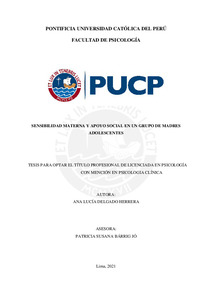| dc.contributor.advisor | Bárrig Jó, Patricia Susana | |
| dc.contributor.author | Delgado Herrera, Ana Lucía | |
| dc.date.accessioned | 2021-10-21T17:20:57Z | |
| dc.date.available | 2021-10-21T17:20:57Z | |
| dc.date.created | 2021 | |
| dc.date.issued | 2021-10-21 | |
| dc.identifier.uri | http://hdl.handle.net/20.500.12404/20692 | |
| dc.description.abstract | La presente investigación tuvo como propósito principal establecer la relación entre la
sensibilidad materna y el apoyo social percibido en un grupo de madres adolescentes.
Participaron 21 diadas de madres, entre 15 y 19 años (M = 17.52; DE = 1.29), y sus bebés
entre 6 y 36 meses (M = 13.48; DE = 8.20). Los instrumentos utilizados fueron el Maternal
Behavior Q-Set, versión 3.1 (Pederson et al., 1999) en la modalidad de observación y los
Cuestionarios de Evaluación de Apoyo Social adaptados al español por Musitu et al. (2001).
Los resultados mostraron que no existe una asociación significativa entre las variables de
estudio. Sin embargo, al considerar los perfiles de maternidad se halló una correlación
significativa e inversa entre el apoyo de la madre y sensibilidad no sincrónica. Además, la
dimensión aceptación como persona se asocia de manera significativa y directa con el perfil
sensible vs no sensible; mientras que entre convergencia de metas y desconectada existe una
asociación significativa e inversa. De acuerdo a los objetivos específicos, se describió la
sensibilidad materna obteniéndose un nivel adecuado en las puntuaciones. En cuanto al apoyo
social, las participantes perciben mayor soporte de parte del mejor amigo/a. Respecto a las
variables sociodemográficas, se encontraron diferencias significativas en el apoyo social
según la edad, el grado de instrucción y el estado de relación de la madre. En general, los
hallazgos indican que predomina la capacidad para brindar un cuidado sensible hacia sus
bebés y revelan la importancia del apoyo social para las madres adolescentes. | es_ES |
| dc.description.abstract | The main purpose of this research was to establish the relationship between maternal
sensitivity and perceived social support in a group of teenage mothers. Twenty-one mothers,
between 15 and 19 years old (M = 17.52; SD = 1.29), and their babies between 6 and 36
months (M = 13.48; SD = 8.20) participated. The instruments used were the Maternal
Behavior Q-Set version 3.1 (Pederson et al., 1999) in observation mode and the Social
Support Evaluation Questionnaires adapted to Spanish by Musitu et al. (2001). The results
show no significant association between the global scores of each variable. However, when
considering maternal profiles, a significant and inverse correlation was found between
mother's support and nonsynchronous sensitivity. Also, the dimension acceptance as a
person is associated in a significant and direct way with the sensitive vs insensitive profile;
while convergence of goals and disconnected were inversely and significant associated.
According to the specific objectives, maternal sensitivity was described, obtaining an
adequate level in the scores. In terms of social support, participants perceived more social
support from the best friend. Regarding sociodemographic variables, significant differences
were found in social support according to age, educational level and mother's relationship
status. Overall, these findings indicates that the ability to provide sensitive care for their
babies predominates and reveals the importance of social support for teenage mothers. | es_ES |
| dc.language.iso | spa | es_ES |
| dc.publisher | Pontificia Universidad Católica del Perú | es_ES |
| dc.rights | info:eu-repo/semantics/openAccess | es_ES |
| dc.rights | Atribución 2.5 Perú | * |
| dc.rights.uri | http://creativecommons.org/licenses/by/2.5/pe/ | * |
| dc.subject | Sensibilidad | es_ES |
| dc.subject | Maternidad | es_ES |
| dc.subject | Madres adolescentes | es_ES |
| dc.subject | Soporte social | es_ES |
| dc.title | Sensibilidad materna y apoyo social en un grupo de madres adolescentes | es_ES |
| dc.type | info:eu-repo/semantics/bachelorThesis | es_ES |
| thesis.degree.name | Licenciado en Psicología con mención en Psicología Clínica | es_ES |
| thesis.degree.level | Título Profesional | es_ES |
| thesis.degree.grantor | Pontificia Universidad Católica del Perú. Facultad de Psicología | es_ES |
| thesis.degree.discipline | Psicología con mención en Psicología Clínica | es_ES |
| renati.advisor.dni | 09391905 | |
| renati.advisor.orcid | https://orcid.org/0000-0003-4685-5760 | es_ES |
| renati.author.dni | 48067536 | |
| renati.discipline | 313026 | es_ES |
| renati.juror | Nóblega Mayorga, Magaly Suzy | es_ES |
| renati.juror | Bárrig Jó, Patricia Susana | es_ES |
| renati.juror | Marinelli, Francesco | es_ES |
| renati.level | https://purl.org/pe-repo/renati/level#tituloProfesional | es_ES |
| renati.type | https://purl.org/pe-repo/renati/type#tesis | es_ES |
| dc.publisher.country | PE | es_ES |
| dc.subject.ocde | https://purl.org/pe-repo/ocde/ford#5.01.00 | es_ES |






